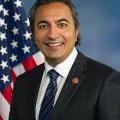6th Assembly District
Not in 6th Assembly District? Find your guide.
RETURN BALLOTS BY TUESDAY, MARCH 3RD
The Courage California Voter Guide compiles the information that allows you to make informed decisions about the races on your ballot, based on your values. Vote in every race on your ballot! It's our right and our responsibility. Please share this guide with your friends and family.
Voting has changed in Sacramento County this year. The Voter’s Choice Act was enacted in the county to make voting more convenient. Changes include an expanded period of in-person early voting, every registered voter in the county will receive a vote-by-mail ballot, and every registered voter in the county is able to vote in-person at any Vote Center in their county. Have questions about the changes to voting in Sacramento County? Find out how to vote in Sacramento County.
Congress
6th Congressional District
Representative Doris Matsui was born in the Poston War Relocation Center in Arizona; her parents had been forced from their homes in the Central Valley and met in the camp. Her family relocated back to the Central Valley, where Matsui was raised. She attended the University of California at Berkeley, where she met her husband, the late Congressman Bob Matsui. After his unexpected passing in 2005, she ran for his seat in a special election, which was then California’s 5th District, and won. The 2010 redistricting shifted her to the present 6th District; regardless, she has won every election since by comfortable margins.
Matsui serves on the House Energy and Commerce Committee, and four subcommittees. Matsui has long campaigned on improving education, supporting green and renewable energies, and expanding access to healthcare. She has criticized the Trump administrations’ attacks on the EPA, and California's own efforts to combat air pollution and maintain CAFE standards. She supports tax incentives for clean energy, including loans for homeowners to retrofit homes and grants to modernize electrical grids.
She is a strong supporter of the Affordable Care Act, and has fought for comprehensive mental health reforms. In 2014, she sponsored and helped pass helped the Excellence in Mental Health Act, which funded community behavioral health clinics in pilot states.
Matsui has also become increasingly outspoken against the Trump administration's fear mongering, and discriminatory immigration and detention policies. After visiting a detention processing center in McAllen, Texas, the Congresswoman wrote an op-ed stating she was “sickened” by the conditions, and called for “wholesale reform” that includes investment in Central American nations, ending the separation of families at the border, and ending the role of private prisons at the border.
Rep. Matsui is challenged by Benjamin Emrad (D), Chris Bish (R), and Sherwood Ellsworthy Haisty, Jr. (R). Matsui stands out as the best progressive choice because of her commitment to progressive values and vision for a healthier, more just and vibrant future.
According to our analysis, Matsui is the strongest choice for progressive leadership in office.
Representative Doris Matsui was born in the Poston War Relocation Center in Arizona; her parents had been forced from their homes in the Central Valley and met in the camp. Her family relocated back to the Central Valley, where Matsui was raised. She attended the University of California at Berkeley, where she met her husband, the late Congressman Bob Matsui. After his unexpected passing in 2005, she ran for his seat in a special election, which was then California’s 5th District, and won. The 2010 redistricting shifted her to the present 6th District; regardless, she has won every election since by comfortable margins.
Matsui serves on the House Energy and Commerce Committee, and four subcommittees. Matsui has long campaigned on improving education, supporting green and renewable energies, and expanding access to healthcare. She has criticized the Trump administrations’ attacks on the EPA, and California's own efforts to combat air pollution and maintain CAFE standards. She supports tax incentives for clean energy, including loans for homeowners to retrofit homes and grants to modernize electrical grids.
She is a strong supporter of the Affordable Care Act, and has fought for comprehensive mental health reforms. In 2014, she sponsored and helped pass helped the Excellence in Mental Health Act, which funded community behavioral health clinics in pilot states.
Matsui has also become increasingly outspoken against the Trump administration's fear mongering, and discriminatory immigration and detention policies. After visiting a detention processing center in McAllen, Texas, the Congresswoman wrote an op-ed stating she was “sickened” by the conditions, and called for “wholesale reform” that includes investment in Central American nations, ending the separation of families at the border, and ending the role of private prisons at the border.
Rep. Matsui is challenged by Benjamin Emrad (D), Chris Bish (R), and Sherwood Ellsworthy Haisty, Jr. (R). Matsui stands out as the best progressive choice because of her commitment to progressive values and vision for a healthier, more just and vibrant future.
According to our analysis, Matsui is the strongest choice for progressive leadership in office.
7th Congressional District
Dr. Ami Bera was first elected to California’s 7th Congressional District in 2012, defeating Republican incumbent Dan Lungren after redistricting. Rep. Bera was born and raised in southern California, and earned his B.S. and M.D. from the University of California, Irvine. He moved to the Sacramento area in the mid 1990s and currently lives with his family in Elk Grove. As a doctor, improving access to health care and reducing prescription drug costs have been central to Rep. Bera’s platform, as has protecting Medicare and Social Security.
Prior to his election to Congress, Rep. Bera served as Sacramento County’s Chief Medical Officer, and was a clinical professor and associate dean for admissions at the University of California, Davis.
In the House, Rep. Bera currently serves as the Vice Chair of the Committee on Science, Space, and Technology; he is also the Chair of the Subcommittee on Asia, the Pacific, and Nonproliferation in the House Committee on Foreign Affairs.
Rep. Bera has been a strong proponent of women’s issues, including improving early access to healthcare, protecting reproductive choice, increasing funding for Title X and the reauthorization of the Violence Against Women Act. He has fought the Trump administrations roll backs of clean air and water regulations, and supports investments in renewable, green energy, but is not a co-sponsor of the Green New Deal resolution. After California’s devastating wildfires, he co-sponsored legislation to improve the resilience of electrical grids. He’s stated his support of publicly owned utilities but has not specifically called for public ownership of PG&E. He supported the Elijah E. Cummings Lower Drug Costs Now Act, which, among other reforms, would allow Health & Human Services to negotiate the cost of 250 drugs for Medicare recipients. While he supports a path to universal healthcare, he has not supported Medicare for All plans.
Rep. Bera is running against Jeff Burdick (D), Jon Ivy (R), Buzz Paterson (R), and Chris Richardson (G). The district is a battleground district that can be tough for Democrats to win; the margin of victory was often less than 3% for Bera. While Rep. Bera is more conservative on some issues, this seat is a must-keep for Democrats, and his support on other key progressive issues is vital. Rep. Bera is the best choice for a progressive voice in this race.
Dr. Ami Bera was first elected to California’s 7th Congressional District in 2012, defeating Republican incumbent Dan Lungren after redistricting. Rep. Bera was born and raised in southern California, and earned his B.S. and M.D. from the University of California, Irvine. He moved to the Sacramento area in the mid 1990s and currently lives with his family in Elk Grove. As a doctor, improving access to health care and reducing prescription drug costs have been central to Rep. Bera’s platform, as has protecting Medicare and Social Security.
Prior to his election to Congress, Rep. Bera served as Sacramento County’s Chief Medical Officer, and was a clinical professor and associate dean for admissions at the University of California, Davis.
In the House, Rep. Bera currently serves as the Vice Chair of the Committee on Science, Space, and Technology; he is also the Chair of the Subcommittee on Asia, the Pacific, and Nonproliferation in the House Committee on Foreign Affairs.
Rep. Bera has been a strong proponent of women’s issues, including improving early access to healthcare, protecting reproductive choice, increasing funding for Title X and the reauthorization of the Violence Against Women Act. He has fought the Trump administrations roll backs of clean air and water regulations, and supports investments in renewable, green energy, but is not a co-sponsor of the Green New Deal resolution. After California’s devastating wildfires, he co-sponsored legislation to improve the resilience of electrical grids. He’s stated his support of publicly owned utilities but has not specifically called for public ownership of PG&E. He supported the Elijah E. Cummings Lower Drug Costs Now Act, which, among other reforms, would allow Health & Human Services to negotiate the cost of 250 drugs for Medicare recipients. While he supports a path to universal healthcare, he has not supported Medicare for All plans.
Rep. Bera is running against Jeff Burdick (D), Jon Ivy (R), Buzz Paterson (R), and Chris Richardson (G). The district is a battleground district that can be tough for Democrats to win; the margin of victory was often less than 3% for Bera. While Rep. Bera is more conservative on some issues, this seat is a must-keep for Democrats, and his support on other key progressive issues is vital. Rep. Bera is the best choice for a progressive voice in this race.
State Assembly, 6th District
According to her campaign website, Jackie Smith of Rocklin, CA, is running for office in Assembly District 6 in order to advocate for environmental justice, affordable housing for the California workforce, and healthcare.
Smith serves as a Commissioner and Legislative Representative on the Placer County Older Adult Advisory Commission and is also a member of the California Alliance for Retired Americans. Her previous professional experience is largely oriented around technology, and she has also served on health-care oriented non-profit boards, including Sunburst Projects, and the Sacramento Rainbow of Commerce. Smith’s previous roles in her community indicate she will advocate for public health and inclusivity.
According to her campaign website, Smith is ready to advocate for the California workforce in regard to housing, education, healthcare, and stable retirement. That said, this position would be her first in public office.
Smith is running against Republican incumbent Kevin Kiley (R), who has consistently failed to fight corporate interests in favor of his constituents and has a lifetime score of 0 on Courage Score, our annual analysis of a legislator's progressive voting records. According to recent election results, it is challenging for Democrats to win this seat. Though the odds are against Smith, her recent endorsement by the California Labor Federation suggests that she has the momentum required to help inspire progressives in this race.
According to our analysis, Smith is the strongest choice for effective leadership in office.
According to her campaign website, Jackie Smith of Rocklin, CA, is running for office in Assembly District 6 in order to advocate for environmental justice, affordable housing for the California workforce, and healthcare.
Smith serves as a Commissioner and Legislative Representative on the Placer County Older Adult Advisory Commission and is also a member of the California Alliance for Retired Americans. Her previous professional experience is largely oriented around technology, and she has also served on health-care oriented non-profit boards, including Sunburst Projects, and the Sacramento Rainbow of Commerce. Smith’s previous roles in her community indicate she will advocate for public health and inclusivity.
According to her campaign website, Smith is ready to advocate for the California workforce in regard to housing, education, healthcare, and stable retirement. That said, this position would be her first in public office.
Smith is running against Republican incumbent Kevin Kiley (R), who has consistently failed to fight corporate interests in favor of his constituents and has a lifetime score of 0 on Courage Score, our annual analysis of a legislator's progressive voting records. According to recent election results, it is challenging for Democrats to win this seat. Though the odds are against Smith, her recent endorsement by the California Labor Federation suggests that she has the momentum required to help inspire progressives in this race.
According to our analysis, Smith is the strongest choice for effective leadership in office.
Statewide Ballot Measures
This proposition would provide $9 billion for desperately needed renovations to public preschools and grade schools throughout the state, and $6 billion for construction to community colleges, the Cal State system, and the UC system. This will allow the state of California to use tax revenue to pay for improvements that local communities cannot afford.
The funding would come from bonds the state would pay back over 35 years, totaling an estimated $26 billion, which includes $15 billion in principal and $11 billion in interest. This investment is well worth the costs. It takes money, after all, to ensure that students -- especially those in districts that can’t afford major capital improvement projects -- do not have to learn in dangerous environments.
The vast majority of Democrats in the state legislature support it, as does Gov. Newsom, and the only major opposition is a group called the Howard Jarvis Taxpayers Association. This is the group famous for destroying California’s school funding system in 1978 through another proposition, ironically one that was also dubbed Prop 13. The group spends most of its time lobbying to reduce tax rates. It has never shown any interest in supporting California’s children, at least if that means wealthy individuals or giant corporations would pay their fair share in taxes.
Critics of the measure have pointed out that the ballot measure’s language includes a provision that frees new multi-family developments around subway stops and bus stations from school impact fees. This provision will make it easier for developers to build apartment buildings within a half-mile of public transit but could also drive up the cost of new housing and take funds away from school districts across the state. Despite this provision, the measure is still supported by most education groups in the state, who believe the overall funding allocation to schools outweighs the impact of reduced funding to school districts located near transit hubs. 2020’s Prop 13 is worth the investment since it means children will soon be able to attend school in buildings that are retrofitted to withstand earthquakes and no longer have lead in their water.
We strongly recommend a YES vote on Prop 13.
This proposition would provide $9 billion for desperately needed renovations to public preschools and grade schools throughout the state, and $6 billion for construction to community colleges, the Cal State system, and the UC system. This will allow the state of California to use tax revenue to pay for improvements that local communities cannot afford.
The funding would come from bonds the state would pay back over 35 years, totaling an estimated $26 billion, which includes $15 billion in principal and $11 billion in interest. This investment is well worth the costs. It takes money, after all, to ensure that students -- especially those in districts that can’t afford major capital improvement projects -- do not have to learn in dangerous environments.
The vast majority of Democrats in the state legislature support it, as does Gov. Newsom, and the only major opposition is a group called the Howard Jarvis Taxpayers Association. This is the group famous for destroying California’s school funding system in 1978 through another proposition, ironically one that was also dubbed Prop 13. The group spends most of its time lobbying to reduce tax rates. It has never shown any interest in supporting California’s children, at least if that means wealthy individuals or giant corporations would pay their fair share in taxes.
Critics of the measure have pointed out that the ballot measure’s language includes a provision that frees new multi-family developments around subway stops and bus stations from school impact fees. This provision will make it easier for developers to build apartment buildings within a half-mile of public transit but could also drive up the cost of new housing and take funds away from school districts across the state. Despite this provision, the measure is still supported by most education groups in the state, who believe the overall funding allocation to schools outweighs the impact of reduced funding to school districts located near transit hubs. 2020’s Prop 13 is worth the investment since it means children will soon be able to attend school in buildings that are retrofitted to withstand earthquakes and no longer have lead in their water.
We strongly recommend a YES vote on Prop 13.
City of Sacramento, District 4
Depending on where you live, you may have the below city district races on your ballot.
Katie Valenzuela has lived in Sacramento for 10 years. According to campaign materials she is running for Sacramento City Council to build on her family’s legacy of community service by using her advocacy and organizing experience to effect change for District 4 constituents.
Valenzuela is an activist and advocate, and currently serves as the Policy & Political Director for the California Environmental Justice Alliance. She does this work to identify the systemic barriers to health and prosperity that face her community, and to find solutions to those issues through the amplification of local voices. Valenzuela was instrumental in forming the Sacramento Urban Agriculture Coalition, which was used to advocate for policies around the growing and selling of food, and the Sacramento Community Land Trust. She was eventually appointed to the California Environmental Justice Committee. Valenzuela has worked in a civil rights law firm, at the State Capitol for the Joint Legislative Committee on Climate Change Policies, and as a private consultant. Her efforts have consistently been focused on providing community groups with the resources to influence the policies that impact them.
Valenzuela is running against Steve Hansen, the incumbent who has held the seat since 2012. Valenzuela stands out as the progressive choice because of her track record of working to advocate on homelessness and housing, and to empower local communities to work in support of diverse policy changes that eliminate systemic barriers to access.
According to our analysis, Katie Valenzuela is the strongest choice for progressive leadership in office.
Katie Valenzuela has lived in Sacramento for 10 years. According to campaign materials she is running for Sacramento City Council to build on her family’s legacy of community service by using her advocacy and organizing experience to effect change for District 4 constituents.
Valenzuela is an activist and advocate, and currently serves as the Policy & Political Director for the California Environmental Justice Alliance. She does this work to identify the systemic barriers to health and prosperity that face her community, and to find solutions to those issues through the amplification of local voices. Valenzuela was instrumental in forming the Sacramento Urban Agriculture Coalition, which was used to advocate for policies around the growing and selling of food, and the Sacramento Community Land Trust. She was eventually appointed to the California Environmental Justice Committee. Valenzuela has worked in a civil rights law firm, at the State Capitol for the Joint Legislative Committee on Climate Change Policies, and as a private consultant. Her efforts have consistently been focused on providing community groups with the resources to influence the policies that impact them.
Valenzuela is running against Steve Hansen, the incumbent who has held the seat since 2012. Valenzuela stands out as the progressive choice because of her track record of working to advocate on homelessness and housing, and to empower local communities to work in support of diverse policy changes that eliminate systemic barriers to access.
According to our analysis, Katie Valenzuela is the strongest choice for progressive leadership in office.



